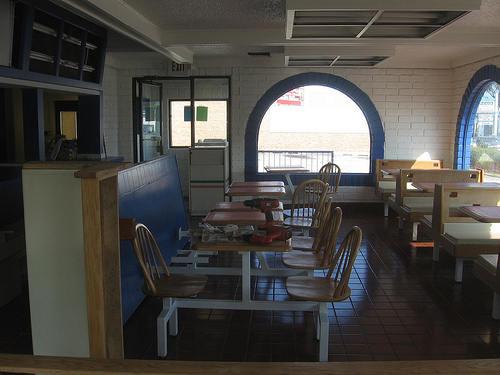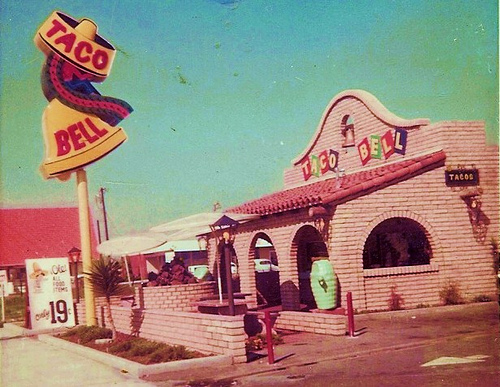It was a square room. The dishwasher lived on wheels and rolled to the sink, where it was hooked up to the faucet when enough mugs and cereal bowls had accumulated. Hanging at the entrance to the dining room was a swinging door–usually propped open, unless there was company for whom the sight of cooking might be jarring, at which times it was closed to protect their delicate sensibilities. Separating the bustle of food preparation from the living room, where my dad regularly gave voice lessons while we stirred the chili, was a set of wooden, slatted doors, the kind Deputy Sheriff Festus had to push through to enter the saloon on Gunsmoke. The floor, the design of which had my mom on her hands and knees periodically, scraping gunk out of the grey channels with a knife, was Of Its Time:

This was the kitchen in my childhood home, the heart of my youth.
In the kitchen we had:
- skim milk and Dr. Pepper
- grandmother-produced applesauce in Mason jars and factory-canned mushrooms
- iceberg lettuce offered in small wooden bowls as our dinner vegetable, a smattering of carrot medallions like lily pads across the top, and a box of Rocky Road ice cream in the freezer
- homemade noodles–rolled out on the counter, whimsically formed into all the letters of the alphabet before they were tossed into boiling chicken stock–and Dolly Madison pies featuring Peanuts characters

Skidding back and forth on this continuum, ponging between “good food” (skim milk, Grandma’s applesauce, iceberg lettuce, homemade noodles) and “bad food” (Dr. Pepper, canned mushrooms, Rocky Road, Dolly Madison pies), was my adolescent self perception.
I wanted to be thinner, smaller, granted space in the world by taking up less of it. But I was bigger, thicker than my friends, diminished for taking up more space.
I was enough in the realm of normal not to be “fat.”
I was enough bigger than normal to be called “fat.”
I knew what I wished to be: someone who met with approval–from friends to boys to parents–but I knew, thanks to my reflection in a can of Dr. Pepper, that I wasn’t entirely approval worthy.
A bad day was when boys on the school bus mooed at me.
A good day was when the world played along with my hopeful sense of self and refrained from commentary.
An even better day was when some small gesture or group of words granted me a feeling of No Need to Worry–when the world was my Jewish mother, urging me to “eat more,” rather than a WASPy one in a crisp oxford shirt who deliberately averted her eyes–a stricken whisper of inhaled breath when I tucked my shirt into my jeans and revealed the curve of my belly.
The very best day was one when my dad and I stopped at Taco Bell.
It was a glamorous place, one rarely visited. For some reason it was just the two of us that day, as though all the other contestants in life’s rich pageant had been eliminated, and we two finalists were the only ones left huddled on the stage, sharing a spotlight, wiping our smudged mascara, gripping each other’s hands as lifelines.
Standing at the counter, we contemplated our choices. Wanting to be budget conscious, wanting him to know I wasn’t overweight because clearly I didn’t eat too much, I ordered a single crunchy taco. He, budget conscious, having battled weight himself, ordered two.
He grabbed the plastic tray from the counter while I found some napkins, and we chose our seats in the dining area. Save for us, it was empty.

Two of us. Three tacos.
The silence was broken by crinkling as we unwrapped our meals.
I was so hungry.
The heft of the taco in my hand was satisfying, like one of my mom’s jars of Avon face cream. It was warm, like the heating pad I put under my head when my ear ached. It was a damn face-cream-heating-pad miracle, this taco.
Tipping my head to the left, I bit into the narrow end of the shell. Three drops of juice ran out of the meat and punctuated my bite as they tap, tap, tapped onto the parchment paper.
Crunching, I put my face close and examined the perfect waxiness of the shredded cheddar, the familiar sprinkle of iceberg. Every ingredient was a wonder of perfection.
As I watched the curls of cheese melting slightly on the warm meat, I heard the plink of my dad’s taco drippings hitting the tray.
Tipping my head again, I took a huge bite. Another. One more.
Then it was gone.
Dad continued to crunch. Across the laminate table, listening to him chew, I was inexplicably happy to be sharing crunches and drips with my dad–his sweetness always clearest when no one else was around. I wanted it to continue.
Being eleven meant my body was a constantly changing terrain, and my friendships were a lasagna of petulance layered over love tucked under resentment dusted with competition. My grades were good, but during gym class the bully, a popular blonde boy, would whisk close to me and mutter “You’re so lame. Next time, you better kick the ball better, or I’m going to kick you where the sun don’t shine.” At home, in the neighborhood, I would discover I was bleeding, run inside to put on a new pad, and head back outside to play Cops & Robbers on bikes with the next-door neighbor, a girl a year younger who rode bra-less and shirtless up and down the boulevard on her ten-speed. At age eleven, I was fine except not.
Plink, plink, plink.
Forever, if I could, I wanted to sit in that all-but-empty Taco Bell dining room, the safest place I’d been in years, and share the sounds of a meal with someone whose shadow protected me.
“That was so good,” I ventured, teetering on a wire of fear that he would respond with a warning that we needed to be careful about how much we ate.
But this was the father who heard my smallest comments. He had heard me say, one time, “I sure love chocolate milk.” After that, sometimes a half-gallon would show up on the top shelf of the fridge, next to the skim.
Another time, I noted, “That lemon chiffon yogurt is the only flavor I’ve ever liked,” and a half dozen small containers appeared, crowding the container of chili leftovers.
My dad was a man who would drive five miles across town to save $.18 per pound on ground beef–and laugh self-deprecatingly at his compulsion to do so–and he would go to any lengths to seek out a symbol that he’d registered an offhand comment. Always, he absorbed my words without judging my hips. Always, he showed me love by hearing me.
At the Taco Bell that day, impressed–not appalled–by the way I’d shoved that taco down my throat in four bites, he smiled, enjoying my appetite, lighting the room from napkin dispenser to trash bin.
“Well, then, how about another?” he asked.
$.59 and four bites later, we gathered our plastic tray, tipped our crumpled papers through the swinging mouth of the garbage. I kept my half-drunk cup of water, clicking the straw between my front teeth as we walked together across the blackness of the parking lot, feeling the sun on my face,
the fullness of unconditional love in my stomach.
——————————-
The inspiration for this post came from a piece that appeared in the Life in Chains series on Eater.com. The one that ran there is a vastly superior essay, but I nodded the whole time I read it, thinking, “I had something much like this in my life.” You can read that excellent essay here: “Finding Home at Taco Bell.”
It is hella good, so I’m almost afraid you’ll go read it, for mine suffers in comparison.
Also, my friend Brooke, the person who shared the Life in Chains essay with me, wrote her take on “fast food family memories” which was then posted on a blog called Well Fed, Flat Broke. You can read Brooke’s post here: “The Golden Days.”
In return, Emily of Well Fed, Flat Broke wrote a post that appeared on Brooke’s blog, Miss Teen USSR. Emily’s take on family life and Dairy Queen can be read here: “Dairy Queen.”


Leave a Reply